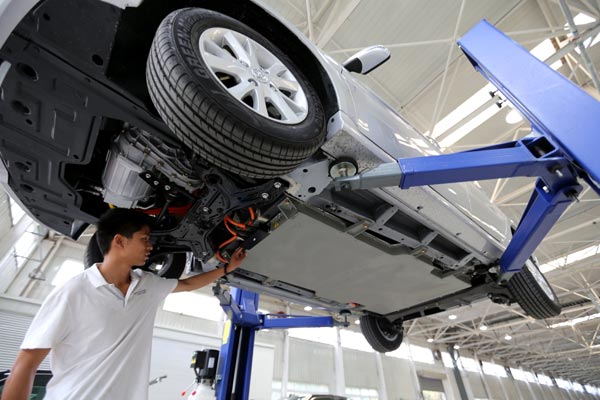

A technician checks a car battery at the production line at BJEV, the new-energy vehicle arm of BAIC Motor, in Beijing. Wang Zhen / For China Daily
Huge drive needed to meet government goals despite promising sales last year
An uphill battle looms large for China's new energy vehicle sector despite the fact 2014 was tipped to be the starting point of the alternative fuel vehicle era after promising sales performances.
China sold 53,000 new energy vehicles in the first 11 months of 2014 and an estimated 60,000 in the whole year, 3.5 times the figure in 2013.
Despite the surge, it seems to be an exceedingly difficult - if not impossible - task to achieve the central government's goal of selling 330,000 new energy vehicles in 39 cities or clusters of cities from 2014 to 2015.
"Four fifths of the sales goals are still to be finished in the next year," said Wang Binggang, a senior expert of the nation's new-energy vehicle program, at an industry summit in late December.
Wang said that meant 270,000 new energy vehicles would have to be sold in 2015, 4.5 times the figure in 2014.
"Some local authorities will be forced to resort to 'unconventional wisdom'. Otherwise, they will be kicked off the list of cities where new energy vehicle purchasers are eligible for central government subsidies," Tang Lin, a senior executive at Shenzhen BYD Daimler New Technology Co, told the Economic Observer.
Ironically, authorities in some cities have not shown enthusiasm for the job, said Wang. "In some cities we could not even find those in charge of promoting new energy vehicles when we went to inspect how things were going there," he said.
Industry insiders explained that despite the central government's favorable policies, it usually takes time for local governments to come up with their own policies and the delay had, to some extent, dampened the enthusiasm of local new energy vehicle makers and customers.
Chen Feng, president of Hangzhou-based automaker Skio agreed. "Even now the city government has not yet released its policies about subsidies," he said at an industry meeting in late December.
In addition to the subsidies, the central government released a series of policies to stimulate the development of the new energy vehicle industry.
New energy vehicle buyers are exempt from purchase tax until the end of 2017. The State Council also stipulated that new energy vehicles should account for 10 percent of the governments' newly purchased vehicles in 2014, 20 percent in 2015 and 30 percent in 2016.
The policies have achieved some results. A survey by the Ministry of Industry and Information Technology showed that passenger cars accounted for about 70 percent of 60,000 new energy vehicles sold in 2014, indicating their growing popularity among private car buyers.
However, obstacles still remain in terms of infrastructure construction. Building charging poles is difficult in many communities, especially for those who do not have fixed parking lots.
When it comes to public charging stations, although private capital is invited to play a role, investors are adopting a wait-and-see attitude as they have yet to find a profitable business mode.
Authorities in some cities do not offer subsidies to people who buy new vehicles from makers from other cities.
Others are working together for a new form of protectionism. "Some propose that if you make vehicles produced in my city eligible for subsidies in your city, I will make your vehicles eligible for subsidies in mine," Xu Xiaogui, a Venucia sales executive at Dongfeng Nissan told the Economic Observer.
Wang, the senior expert of the nation's new energy vehicle program, said it was time to give an overall appraisal of cities' performance in promoting the vehicles.
"It is no use beating around the bush. Those who have done a good job should be awarded; those who have too much difficulty finishing the job can withdraw from the program," he said.
Wang called on automakers showing more interest in producing electric vehicles to come up with more plug-in hybrids.
"We have too few plug-in hybrids in the market. Chinese automakers should have made more preparatory work in this respect," he said.
"If we give up plug-in hybrids, the road ahead will become more difficult for us. It is time for those who are against plug-in hybrids to be more tolerant. Otherwise, we are forcing ourselves to lag behind others," said Wang.
Those in the new energy vehicle sector have long been divided on their choice of electric vehicles or plug-in hybrids.
Zhang Yong, a senior executive at BJEV, the new-energy vehicle arm of BAIC Motor, said, "I don't think we should differentiate them by ourselves."
"Plug-in hybrids are not necessarily more popular than electric ones. Both should be available in the market and it should be up to the buyers to choose," he said.
China to extend new-energy car subsidies to 2020
2014-12-31China mulls lowering threshold for manufacturing new energy vehicles
2014-12-03Multi-pronged efforts needed to pave way for new energy cars
2014-11-11Chile banks on new energy to attract fresh investment
2014-11-11New energy provides electricity to hundreds of thousands in Xinjiang
2014-11-04Cities to boost use of new-energy vehicles
2014-10-23Copyright ©1999-2018
Chinanews.com. All rights reserved.
Reproduction in whole or in part without permission is prohibited.